Paperhouse
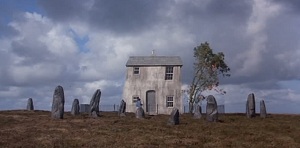 Don’t try to recapture your childhood. You’ll just end up watching The Goonies, grumbling, and muttering to yourself that you can’t believe you were such an easily entertained idiot. You also weren’t precocious, just irritating. Precocious is how adults describe children who annoy them, when they’re too polite to say so.
Don’t try to recapture your childhood. You’ll just end up watching The Goonies, grumbling, and muttering to yourself that you can’t believe you were such an easily entertained idiot. You also weren’t precocious, just irritating. Precocious is how adults describe children who annoy them, when they’re too polite to say so.
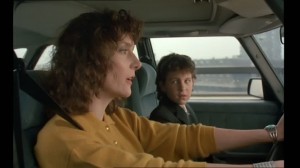 My fear of disillusioning myself completely has kept me from re-watching The NeverEnding Story. I first saw it when I was six years old and it scared the hell out of me. So much so that I left the theater (flying dogs and scary monsters don’t entertain all children). I saw it again a few years later, and while I thought the lead character was annoying, I was amused by the fantasy world and didn’t mind the heavy-handed messages about how reading is, well, not just fundamental, but the most important interest you can have. Or maybe that’s just how I perceive it now; it always had a strange energy to it as compared to most children’s films. It had a menacing, invasive quality. That may be because it was made by Germans (directed by Wolfgang Petersen, the director of In the Line of Fire, Air Force One, and Das Boot), in Germany, and shot in German in one version, and in English for a shorter international release and so everything is specifically calculated. So it sort of seems both cynical and manipulative, while being overly simplified.
My fear of disillusioning myself completely has kept me from re-watching The NeverEnding Story. I first saw it when I was six years old and it scared the hell out of me. So much so that I left the theater (flying dogs and scary monsters don’t entertain all children). I saw it again a few years later, and while I thought the lead character was annoying, I was amused by the fantasy world and didn’t mind the heavy-handed messages about how reading is, well, not just fundamental, but the most important interest you can have. Or maybe that’s just how I perceive it now; it always had a strange energy to it as compared to most children’s films. It had a menacing, invasive quality. That may be because it was made by Germans (directed by Wolfgang Petersen, the director of In the Line of Fire, Air Force One, and Das Boot), in Germany, and shot in German in one version, and in English for a shorter international release and so everything is specifically calculated. So it sort of seems both cynical and manipulative, while being overly simplified.
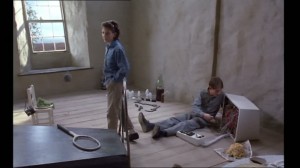 A viewer going into Bernard Rose’s Paperhouse completely blind might have the same trepidation as I do about watching The NeverEnding Story again. Rose is, like Petersen, also European, and also went on to make more adult-oriented films such as Candyman and Immortal Beloved. But Rose’s lack of experience making very calculated films, he was only 27 when he shot Paperhouse and it was his first film to get any sort of attention, aids him immeasurably. That’s because he hadn’t yet learned how to competently pander.
A viewer going into Bernard Rose’s Paperhouse completely blind might have the same trepidation as I do about watching The NeverEnding Story again. Rose is, like Petersen, also European, and also went on to make more adult-oriented films such as Candyman and Immortal Beloved. But Rose’s lack of experience making very calculated films, he was only 27 when he shot Paperhouse and it was his first film to get any sort of attention, aids him immeasurably. That’s because he hadn’t yet learned how to competently pander.
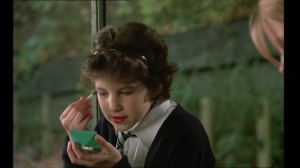 Paperhouse is about Anna (Charlotte Burke, in her only role) who is a troubled 11-year-old girl who drifts into a fantasy world of her drawings while she drifts into unconsciousness and tries to recover from a glandular fever. An American director might have tried to turn Anna into an adorable blonde moppet, but Burke is tomboyish and has a short fuse (and looks exactly like a young Patrick Dempsey). She’s not cuddly or inviting, just needy; especially when she has an older friend help her put on makeup. And it couldn’t look more wrong on her.
Paperhouse is about Anna (Charlotte Burke, in her only role) who is a troubled 11-year-old girl who drifts into a fantasy world of her drawings while she drifts into unconsciousness and tries to recover from a glandular fever. An American director might have tried to turn Anna into an adorable blonde moppet, but Burke is tomboyish and has a short fuse (and looks exactly like a young Patrick Dempsey). She’s not cuddly or inviting, just needy; especially when she has an older friend help her put on makeup. And it couldn’t look more wrong on her.
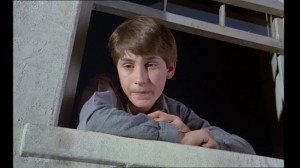 And since Paperhouse deals, in a certain way, with Anna’s “imaginary” friend Marc (Elliott Spiers) becoming real, it could easily drift into a slightly less obnoxious version of Drop Dead Fred. That film had a foreign director, Ate De Jong, who was told by the studio to make a movie that was both gross and lovable. Which, of course, resulted in neither. [It’s a film begging for a remake.] Rose gives Paperhouse a creepy subtext that hints first just at Anna’s overreaction to her father’s lengthy business trips, and then suggests that he might be an alcoholic in rehab and her mother (Glenne Headly*) is just telling Anna that he’s “away.” And then movie goes even a little further, using Anna’s fever dreams to introduce to us that maybe her father is abusive in a different, more invasive way.
And since Paperhouse deals, in a certain way, with Anna’s “imaginary” friend Marc (Elliott Spiers) becoming real, it could easily drift into a slightly less obnoxious version of Drop Dead Fred. That film had a foreign director, Ate De Jong, who was told by the studio to make a movie that was both gross and lovable. Which, of course, resulted in neither. [It’s a film begging for a remake.] Rose gives Paperhouse a creepy subtext that hints first just at Anna’s overreaction to her father’s lengthy business trips, and then suggests that he might be an alcoholic in rehab and her mother (Glenne Headly*) is just telling Anna that he’s “away.” And then movie goes even a little further, using Anna’s fever dreams to introduce to us that maybe her father is abusive in a different, more invasive way.
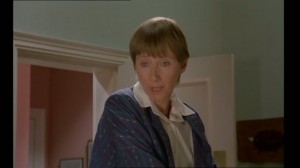 Smartly, Rose doesn’t hammer home these ideas. The film doesn’t turn into a message movie, and this stuff can be ignored by a less perceptive viewer. Or it can be explained by the way that Anna’s loneliness manifests itself in her dreams. Her father is, at one point, introduced in her dream by a guitar stinger more suitable for a slasher movie. At first that seems like a dated misstep, until we consider how each image is part of Anna’s skewed viewpoint. Her world, encapsulated by this large, creepy, mostly empty house, in the middle of a spacious field, is the suggestion that she hasn’t lived long enough to fill in the details. As a film, Paperhouse is about Anna’s discovery of something she didn’t quite understand before- her own mortality. And she spends the entire film learning about it piece by piece. The more the images would be filled in, the more she would be aware of an adult’s added complications and subsequent limitations, as each new object creates a new hazard.
Smartly, Rose doesn’t hammer home these ideas. The film doesn’t turn into a message movie, and this stuff can be ignored by a less perceptive viewer. Or it can be explained by the way that Anna’s loneliness manifests itself in her dreams. Her father is, at one point, introduced in her dream by a guitar stinger more suitable for a slasher movie. At first that seems like a dated misstep, until we consider how each image is part of Anna’s skewed viewpoint. Her world, encapsulated by this large, creepy, mostly empty house, in the middle of a spacious field, is the suggestion that she hasn’t lived long enough to fill in the details. As a film, Paperhouse is about Anna’s discovery of something she didn’t quite understand before- her own mortality. And she spends the entire film learning about it piece by piece. The more the images would be filled in, the more she would be aware of an adult’s added complications and subsequent limitations, as each new object creates a new hazard.
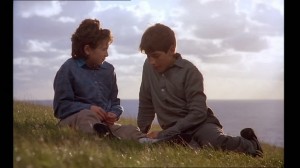 That’s why Paperhouse avoids the sappiness that could have taken over its concept**. And so the scenes of Anna running around mountains in a moment of escape or toward an enormous lighthouse don’t have the feeling of something saccharine and whitewashed like The Sound of Music but rather it has the dark undercurrent of the delusions of the girls in Peter Jackson’s Heavenly Creatures. Now Anna doesn’t have the murderous intent of those two girls. But like Jackson, Rose is superb at developing spatial distance between characters. So we always feel, even in the supposed real world, that something isn’t quite right.
That’s why Paperhouse avoids the sappiness that could have taken over its concept**. And so the scenes of Anna running around mountains in a moment of escape or toward an enormous lighthouse don’t have the feeling of something saccharine and whitewashed like The Sound of Music but rather it has the dark undercurrent of the delusions of the girls in Peter Jackson’s Heavenly Creatures. Now Anna doesn’t have the murderous intent of those two girls. But like Jackson, Rose is superb at developing spatial distance between characters. So we always feel, even in the supposed real world, that something isn’t quite right.
Somehow, that sounds better than a rock monster telling me I should spend more time reading books.
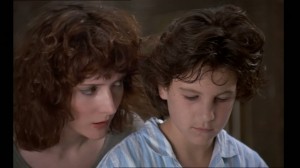 * Headly is one of the film’s few missteps. Not because she’s an incompetent actress, but rather because apparently the producers decided at the last moment that her character should be British, and so she was forced to re-dub all of her dialogue with a British accent. Why she wasn’t British in the first place is unclear, as everything else about the movie is but it causes a disconnect when she speaks, because it’s never live sound, and the ADR doesn’t always properly sync up.
* Headly is one of the film’s few missteps. Not because she’s an incompetent actress, but rather because apparently the producers decided at the last moment that her character should be British, and so she was forced to re-dub all of her dialogue with a British accent. Why she wasn’t British in the first place is unclear, as everything else about the movie is but it causes a disconnect when she speaks, because it’s never live sound, and the ADR doesn’t always properly sync up.
** Similar to Vincent Ward’s Vigil, also about an isolated tomboy discovering the connection between her fantasy life and hard reality.




Kat says:
December 29th, 2013
6:56 pm
‘…rock monster telling me I should spend more time reading books’. I can vaguely recall the book this is based on ‘Marianne Dreams’ by Catherine Storr featuring rock monsters. Very creepy 70s version ‘Escape into night’.
xavier says:
October 26th, 2017
3:52 pm
I love this movie é__è
Cry everytime. So beautiful. I wonder what Charlotte became.
The music (Fauré/Powell/Zimmer) is heaven.